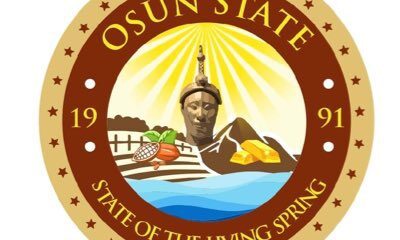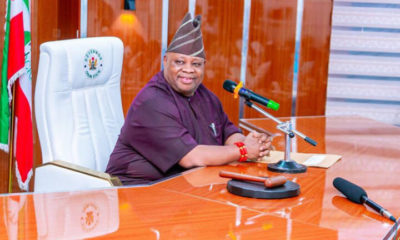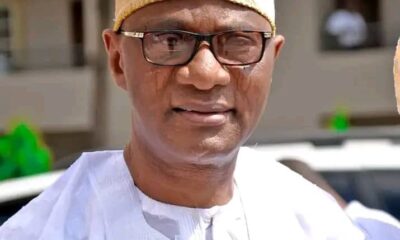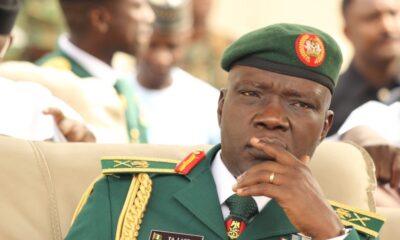Opinion/Feature
Osun Tribunal and PDP’s Panicky Response to Reality
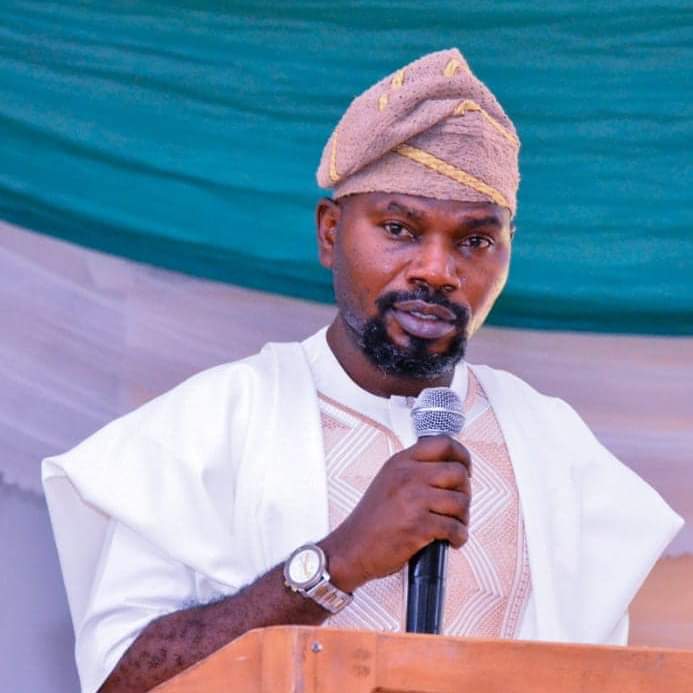
By Ismail Omipidan
By tomorrow, Thursday, December 1, 2022, the Election Petitions Tribunal sitting in Osogbo will continue hearing in the petition filed by Adegboyega Oyetola and the All Progressives Congress, APC, challenging the declaration of Senator Ademola Adeleke as the winner of the July 16 governorship contest.
Before the tribunal adjourned the last time, it ruled that the Independent National Electoral Commission, INEC, should produce Senator Ademola’s certificates and other attachments he filed with INEC when he ran for the governorship in 2018.
For those who may be coming across this Tribunal update for the first time and for the records, Oyetola and APC are challenging the outcome of the election on two main grounds.
One, that Senator Ademola was not qualified to run at the time he did. Two, that there was over-voting in 749 polling units across 10 LGAs.
What are the facts of the issues concerning qualification?
Recall that it is common knowledge that, in 2019, Senator Adeleke faced criminal allegations of examination malpractice.
He was arrested and brought before the court. He was granted bail, and then he travelled abroad. He however did not show up again until he returned barely a year to the July election.
Interestingly, when he was contesting in 2018, he claimed to have registered for GCE O’ Level in 1981 but had F9 in English Language and was recorded absent for other subjects.
Ironically, his profile on the website of the National Assembly at the time also indicated that he is a holder of a Diploma Certificate in Criminology from Jacksonville State University (JSU), where he purportedly graduated from in 1986.
However, in an investigation carried out by the International Centre for Investigative Reporting, ICIR, at the time, the above claim was faulted by Buffy Lockette, the Director of Public Relations at the university.
The fact -check done by ICIR further revealed that while it was true that Senator Adeleke had indeed enrolled at the institution, he was never awarded any certificate.
A further inquiry from the West African Examination Council’s website at the time to verify Senator Adeleke’s O’ Level result being paraded then, using examination number 19645/149 came back as “result not available for this candidate in the specified year and exams diet.” So, based on the foregoing, as at 2018, he had no O’Level results.
But upon his return, he claimed he has a diploma, awarded to him mid last year, and that the said certificate qualified him for a B.Sc. in Criminal Justice, from the Atlanta Metropolitan State College in the United States.
Interestingly, he claimed to have obtained the degree barely 24 days after getting the said Diploma certificate.
There are indeed interesting days ahead at the Tribunal, beginning from tomorrow.
Before then, below is the review of what transpired in the last three sittings of the Election Petitions Tribunal:
Day 1
Monday, November 21
On this day, an expert witness, Isiaka Olanrewaju, told the Tribunal that he established irregularities in the results used to declare the candidate of the People’s Democratic Party (PDP), Ademola Adeleke, as the Governor-elect by the Independent National Electoral Commission (INEC).
He told the Justice Tertsea Kume-led tribunal that he came to that conclusion after analysing the result forms for the election and comparing them with the Bimodal Voters Accreditation System (BVAS).
On the same day, the tribunal also struck out the application by the Counsel for INEC, Prof. Paul Ananaba, SAN, filed to set aside the Subpoena issued on INEC for the production of Adeleke’s credentials used in the 2018 Governorship Election.
The witness who was led in evidence by the Petitioners’ counsel, Chief Akin Olujinmi (SAN), said he relied on forms EC8As, EC8B, EC8C, EC8D, EC8E and BVAS report released by INEC to arrive at his findings.
Under cross- examination by the INEC counsel, Professor Ananaba, the witness said he analysed the results of the election in 749 units across 10 Local Governments as against 762 units being suggested to him by the counsel for the respondents.
While INEC counsel put it to him that the witness analysed results of 762 units, he responded: “That is your opinion, I worked on just 749 units. where you see 762, I don’t know”.
The witness was also cross-examined by counsel for Adeleke, Onyechi Ikpeazu (SAN), and counsel for the PDP, Alex Izinyon (SAN).
He told the tribunal that though he didn’t operate the BVAS machine on the election day on July 16, 2022, he received the Certified True Copy (CTC) of the BVAS report on the 27th of July 2022 after the election.
The style of the witness’ testimony however threw the entire court into laughter while mentioning the documents used for his analysis, saying: “I used form EC8A, comma, EC8B, comma, EC8C, comma, EC8D, comma, EC8E, no comma and BVAS report”.
He testified that he is an expert who had operated several electronic devices, including BVAS before and was aware that an electoral officer might fail to submit the data imputed into the machine or that if the network was bad, the data submitted would not be successful.
Asked again on whether his analysis was done only where the PDP won, the witness said, “I did my analysis across 749 polling units in 10 local governments regardless of which party won.”
On the same day, the tribunal also granted an application by Oyetola’s counsel, asking to amend the list of witnesses filed before the panel by including the acronym used to represent their names.
Olujinmi had also informed the tribunal that the INEC counsel had filed an application to attack the Subpoena issued by the tribunal on INEC to bring Adeleke’s certificate and other documents he used in the 2018 Governorship Election.
Olujinmi said the evidence of his next witness would be based on the documents being requested for, saying he would wait in the calling of the said witness listed as number 2, until the tribunal decides on the application of the INEC counsel.
The tribunal had earlier fixed Tuesday, the next day, for the hearing of the application and agreed that the witness should wait until it takes a stand on the said application before the INEC counsel withdrew the application.
Upon the withdrawal, the tribunal struck out the application by Counsel for INEC, Ananaba, filed to set aside the Subpoena issued on the INEC for the production of Adeleke’s credentials used in the 2018 Governorship Election.
Day Two, Tuesday, November 22
On this day, INEC failed to produce Adeleke’s certificates, just as a witness insisted he allegedly forged them.
The Osun State Resident Electoral Commissioner (REC) of the Independent National Electoral Commission (INEC) told the Tribunal that the State office of the Commission was not in custody of the certificates of Senator Adeleke.
The REC was billed to appear before the panel in line with a Subpoena issued on him to produce form CF001 of Adeleke which contained his credentials used for the 2018 governorship election.
At the resumed hearing, the counsel for INEC, Professor Paul Ananaba, had told the tribunal that REC could not be brought to court, because he was not aware that the application filed against the Subpoena issued on him had been withdrawn.
After series of arguments, the tribunal Chairman, Justice Tertsea Kume, insisted that whether there was an application against the Subpoena or not, REC or his representative was supposed to be in court to bring the documents requested.
The proceedings then took a dramatic turn when, suddenly, the representative of REC, Mr. Sheu Mohammed, the Deputy Director, Election and Party Monitoring who had been in court abinitio rose and told the court that he was around to represent REC.
It was at this point that INEC Counsel also retracted his statement and said he had just been informed that the representative of REC was around.
When asked to produce the documents requested for, Mohammed told the tribunal that the State office of the commission was not in custody of the documents, saying the copies given to it had been discarded shortly after the 2018 election.
He said: “We are not in custody of the documents. The documents were submitted to the National Headquarters. We were only given photocopies by the National Headquarters for display.
“After we might have done with litigation, the only record we kept in our office are form EC8A Series. ”
Asked by the tribunal to produce the said photocopies given to the State office, the witness said: “We don’t have the photocopies again. We have decongested our system”.
Counsel for Oyetola, Chief Akin Olujinmi (SAN), subsequently argued that the attitude of REC was mainly not to obey the tribunal’s order issued on REC to produce the documents.
He said even if the State office of the Commission did not have the requested documents, “REC is representing INEC here and he has a duty to obtain the said documents at their National Headquarters and he has not said that the National Headquarters cannot find that document.
“So, he cannot excuse the duty of obedience to that Subpoena by his lame explanation that it was submitted to the national headquarters.
“My Lord, I will apply that your Lordship should direct REC to approach the national headquarters and obtain the said documents. They had disobeyed the first order and if they like they should disobey the second order”, Olujinmi argued.
The tribunal subsequently directed Oyetola’s counsel to Section 253(2) of the Evidence Act which indicates that violator of such court order is liable to arrest and commission to prison.
Oyetola’s counsel said he was only being humane, as he would have applied for committal, saying “police is here to arrest him. I don’t see how you can escape from this one”.
Responding to the arguments, counsel for INEC, Professor Ananaba, said, “the representative of REC is here and REC is different from INEC. So, the Subpoena has been complied with because the representative of REC is here to tell the court he is not in custody of the said documents.”
He argued that the tribunal does not have the power to make another order in the same line, claiming that the first order had been complied with.
Counsel for Adeleke, Onyechi Ikpeazu (SAN), in his own objection said since the documents requested to be produce by INEC are Certified True Copies (CTC), it can be applied and paid for, without necessarily bringing REC to court.
He then argued that based on the fact that the petitioners already have the CTC at their disposal, they should be compelled to continue with the calling of the witnesses whose testimony hung on the documents requested from INEC.
Counsel for PDP, Alex Izinyon, SAN, also said that since the petitioners already have the documents in question, they should be compelled to call the witness.
Olujinmi while replying said the respondents’ counsel lost track in the course of their arguments, saying there was an order of the court through subpoena which have not been complied with.
He noted that counsel in the case ought not to do anything that will obstruct the proceeding of the court, saying the issue of the Subpoena is sufficient enough to compel the INEC again to produce the documents.
The tribunal then adjourned ruling in the argument of counsel on the failure of INEC to produce the said documents till Friday, 25th November.
Meanwhile, one of the Petitioners’ witnesses, Evangelist Rasak Adeosun, while giving evidence before the panel, told the tribunal that Adeleke did not attend any university, hence he could not have obtained any certificate.
Asked by Adeleke’s counsel whether he was a staff of the university attended by Adeleke, Adeosun replied: “Did he attend any university? How would I be a staff of the university he didn’t attend”.
He insisted that Adeleke does not have any certificate, just as he told the panel that “I know that there is over-voting, as the total number of the votes cast is more than the accredited voters on BVAS reports.
Adeosun, who served as the State collation agent for the APC hinted that he received reports of the happenings in the polling units on the election day and discovered that there was no substantial compliance with the INEC guidelines and the Electoral Act in the contentious 749 polling units.
Day 3, Friday, November 25
This day, which was the last day of the sittings for the outgone week, the PDP’s panicky response to reality dawned on it as the Tribunal insisted that the INEC Chairman must produce Adeleke’s certificates.
The order followed the failure of the State Resident Electoral Commissioner (REC) of the Commission to produce the certificates in the previous sitting in compliance with the Subpoena issued on the Commission.
In the ruling, the Justice Tertsea Kume-led Tribunal said an application for Subpoena is in Administrative Act and when it is granted, it becomes Judicial Act and the party upon which the Subpoena is issued must comply, citing Section 218 and 219 of the Evidence Act.
It ruled: “An order of the court is bound to be complied with by the party upon which it was made until it is set aside by the court. In the instant case, the order has not been complied with.”
The tribunal further held that the request by the respondents that the petitioners should continue with the calling of the witness whose testimony is hinged on the Adeleke’s credentials was baseless, as the petitioners have the absolute prerogative on how to conduct their case.
It held further that the Petitioners have shown sufficient reasons for the tribunal to compel the the National Chairman of INEC to produce the documents in question.
It then dismissed all the objections raised by the counsel for INEC, Adeleke and PDP, and compelled the National Chairman of the Commission to produce the documents in the next sitting of the panel on Thursday, December 1.
Counsel for the Petitioners, Chief Akin Olujinmi, SAN, described the ruling as a well- researched one, saying it would go a long way in serving the course of justice in the hearing of the petition.
Addressing journalists shortly after the proceedings, Chief Olujinmi, said the court has done the right thing by reordering INEC to produce the requested documents containing Adeleke’s certificates.
Counsel for INEC, Professor Paul Ananaba, SAN, also conceded, saying they were ready now to follow the order of the court by producing the requested documents.
Last line
Will they produce the certificates? It seems only time will tell.
Omipidan, a journalist and former Assistant Editor (Politics) at The Sun, is the media aide to Oyetola
Opinion/Feature
Downstream Deregulation: Between Obasanjo’s Half-measures And Tinubu’s Bold Leadership

Opinion/Feature
UNCOMMON SCHOLAR, EXCEPTIONAL ADMINISTRATOR: MY TRIBUTE TO PROF. OLOYEDE AT 70

By President Bola Tinubu
As Professor Ishaq Oloyede turns 70 tomorrow, October 10, I pay a special tribute to this astute administrator, educator, author, and scholar, currently the Joint Admissions and Matriculation Board (JAMB) Registrar.
As the former Vice Chancellor of the University of Ilorin, Prof. Oloyede’s invaluable contributions to the nation through academia and public-sector administration have significantly impacted the academic community.
ALSO READ: Tinubu Congratulates Zainab Shinkafi-Bagudu On Her Election As President, UICC
His impactful tenure at the University of Ilorin, during which he introduced landmark ideas and innovations that helped the institution attain enviable heights, is on record.
Through patriotic dedication and commitment to his craft, Prof Oloyede imparted knowledge and character to thousands of students who underwent his teaching during his glorious and impactful academic career.
Indeed, the bedrock of development lies in education. Developing nations, including Nigeria, are in dire need of more scholars like Prof. Oloyede. His selfless sacrifices and innovative approaches to learning and leadership give hope for a brighter future.
Perhaps more remarkable is Prof. Oloyede’s transformative leadership at JAMB. He pioneered and sustained a series of reforms and technological innovations that have made the admission process in Nigeria transparent and credible.
In his eight years of stewardship at the board, thus far, Prof. Oloyede has demonstrated an uncommon commitment to financial integrity and accountability in public service. He has also raised the bar in administration and management.
I am proud of Prof. Oloyede’s accomplishments.
The nation owes the Professor of Islamic Jurisprudence a debt of gratitude for transforming JAMB, traditionally a non-revenue-generating government agency, into a consistent contributor to the national treasury through efficient financial management. His contributions to JAMB are invaluable and greatly appreciated.
On this occasion of his 70th birthday, I join members of the academic community, students, JAMB staff, and well-wishers in celebrating this scholar who, in words and deeds, has also done a lot to propagate the Islamic religion.
I pray that Almighty Allah will continue to honour the distinguished professor with health, wisdom and strength to serve the nation for many more years.
Opinion/Feature
Clarification On NNPCL Refinery Operations
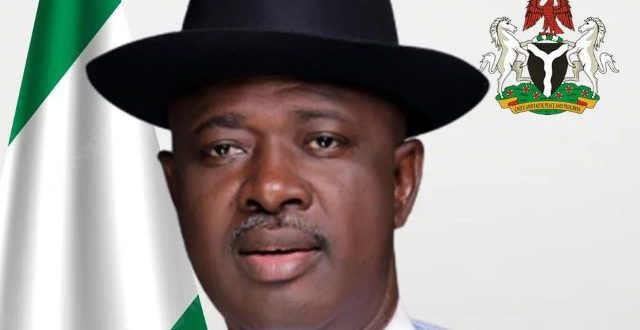
By Sen. Heineken Lokpobiri PhD
My attention has been drawn to statements made by Engr. Kamoru Busari, Director of Upstream in the Ministry of Petroleum Resources, who represented me at a recent conference in Lagos. I wish to categorically state that the claim that I directed the Nigerian National Petroleum Company Limited (NNPCL) to stop running its own refineries and focus solely on equity participation in other refineries is false. This does not represent my position as Minister overseeing the oil sector, nor does it reflect the stance of the Federal Government.
It is important to clarify that NNPCL is a company governed under the Companies and Allied Matters Act (CAMA), with a functional board and management. The Ministry of Petroleum Resources does not control or run NNPCL, as it operates independently like any corporate entity.
ALSO READ: NNPC/Seplat JV’s “Eye Can See” Programme Restores Vision, Hope In Imo
The oil and gas sector is fully deregulated, and the Nigerian government remains committed to promoting in-country refining. We encourage companies, including NNPCL, to operate independently, following global best practices. While we provide strategic guidance, we do not interfere directly in the operations of these companies.
I reaffirm our commitment to supporting the growth and independence of NNPCL, ensuring that its operations are in line with international standards for efficiency and transparency and profitability.
Sen. Heineken Lokpobiri PhD, Minister of State Petroleum Resources (Oil), wrote from Abuja, Nigeria

